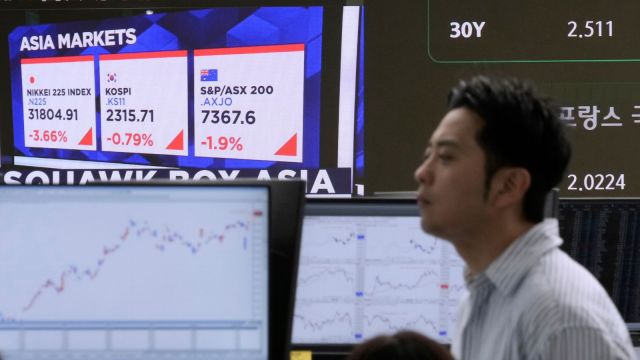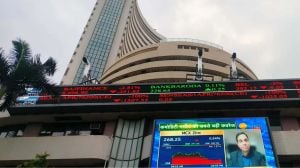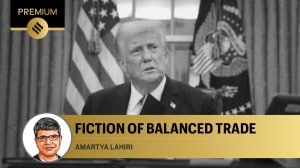‘Fear to euphoria’: Asia stocks zoom after Trump pauses tariffs for most countries; Nikkei jumps 8.8%
Analysts had expected the regional comeback given that US stocks had one of their best days in history on a euphoric Wall Street Wednesday, where investor hopes had run high that Trump would tone down the tariffs.
 A screen displays Asia market indexes of Japan, South Korea, and Australia as a currency trader works at KEB Hana Bank’s forex room in Seoul. (AP photo)
A screen displays Asia market indexes of Japan, South Korea, and Australia as a currency trader works at KEB Hana Bank’s forex room in Seoul. (AP photo)Asian markets soared Thursday after US President Donald Trump announced a 90-day pause on most of his newly imposed tariffs, setting off a global rebound that followed Wall Street’s dramatic surge overnight. Japan’s benchmark Nikkei 225 led the way, jumping 8.8 per cent to 34,510.86 in morning trading.
Other regional indexes followed suit: the Topix in Japan rose 7.9 per cent to 2,534.89, Australia’s S&P/ASX 200 gained 5.1 per cent, and South Korea’s Kospi added 5.2 per cent.
Markets in Hong Kong and Shanghai were also up. Hong Kong’s Hang Seng added 2.8 per cent to 20,821.48. The Shanghai Composite edged up 0.6 per cent to 3,207.35. Stephen Innes, managing partner at SPI Asset Management, called the reaction “from fear to euphoria,” according to Reuters.
“It’s now a manageable risk, especially as global recession tail bets get unwound, and most of Asia’s exporters breathe a massive sigh of relief,” he said, referring to the tariffs on China, which Trump has kept on.
India’s Sensex and Nifty will remain closed on Thursday.
Trump’s tariff pressure on China
In a social media post late Wednesday, Trump wrote: “I have authorized a 90 day PAUSE,” adding that countries not retaliating against the US would be spared from new import levies. However, tariffs on Chinese goods were raised significantly, including a tripling of duties on low-value items to 90 per cent, effective from May 2.
US Customs and Border Protection confirmed preparations to collect country-specific tariffs from 86 nations.
Trump said he was making “tailored deals” with nations open to negotiations, including several Asian countries and the European Union.
In a swift response, China raised its retaliatory tariffs on US goods to 84 per cent, up from the earlier 34 per cent. “The trade war is not over,” Quincy Krosby, chief global strategist at LPL Financial said as per AP. “This is a breather, not a peace treaty.”
Despite the escalation with China, market analysts said the broader 90-day pause offered temporary relief. “It’s now a manageable risk, especially as global recession tail bets get unwound, and most of Asia’s exporters breathe a massive sigh of relief,” said Stephen Innes, managing partner at SPI Asset Management, reported Reuters.
Tokyo leads with corporate gains
- In Tokyo, Fast Retailing shares jumped 8%
- Toyota Motor climbed 9.4%
- Tokyo Electron gained 12%
- Advantest surged 15%
Wall Street rebounds sharply
The optimism in Asia mirrored Wall Street’s rebound.
The S&P 500 spiked per cent, its third-best day since 1940, while the Dow Jones Industrial Average gained nearly 3,000 points (7.9 per cent) and the Nasdaq surged 12.2 per cent.
Europe reacts with losses
While Trump expressed willingness to negotiate with some countries, European markets are experiencing a financial loss as uncertainty persisted. According to Euronews, “A sea of red could be seen across key European and US indexes on Wednesday afternoon as US President Donald Trump’s new tariffs came into effect.”
As of 15:00 CEST on Wednesday:
-
The Euro STOXX 50 was down 4.1%
-
STOXX 600 fell 4.4%
-
France’s CAC 40 dropped 4.2%
-
Germany’s DAX declined 4.2%
-
UK’s FTSE 100 lost 2.9%
-
Italy’s FTSE MIB fell 3.9%
-
Spain’s IBEX 35 dropped 3.4%
European auto stocks also took a hit. Volkswagen AG fell 2.6 per cent, Mercedes-Benz Group AG was down 4.1 per cent, and Ferrari N.V. declined 2.3 per cent, as reported by Euronews.
Vietnam opens dialogue with Washington
Vietnam, originally facing a 46% tariff, agreed to trade talks with the US.
The country committed to easing non-tariff barriers and curbing trade fraud, in a move welcomed by Washington.
US Treasury Secretary Scott Bessent confirmed a 10 per cent blanket tariff on global imports remains active, despite the broader pause. Bond markets responded positively, with the 10-year Treasury yield falling to 4.34 per cent.
Still, experts urged caution. “There hasn’t been any significant progress in negotiations,” Andrea Cicione, head of research at TS Lombard, told The Guardian. “Until that happens, it’s difficult to turn more constructive as the risk of recession is going up.”
(With inputs from AP, Reuters, The Guardian)
Must Read
Buzzing Now
Apr 17: Latest News
- 01
- 02
- 03
- 04
- 05

























